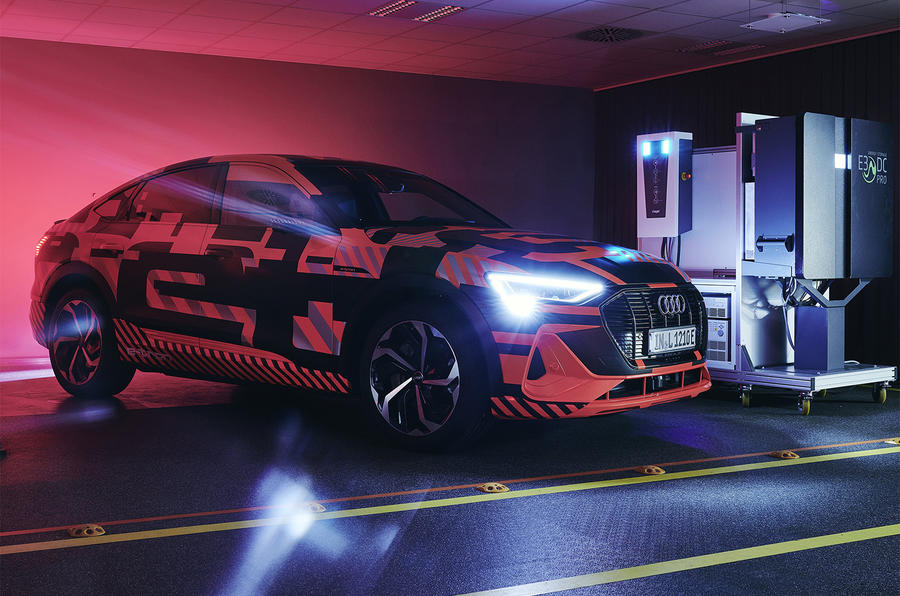Audi has begun working on bi-directional charging, which would allow its EVs to act as an extension of the electricity grid.
The technology, developed by Audi and Hager Group and being trialled on the Audi Audi E-tron electric SUV, allows electric cars to not only receive electricity from home stores via wall chargers but also to store it and even give it back.
Audi said this system would be particularly useful for customers who have solar panels, with the car being able to store home-generated electricity while the sun is shining and return it during times when it isn’t.
An Audi spokesperson said: “Bi-directional charging at home – also known as Vehicle to Home (V2H) – has great potential to reduce the home-owner’s electricity costs and increase network stability. As a further expansion stage in combination with a home storage unit, it's possible to achieve near-complete energy independence and increased security of supply in the event of a blackout.”
Audi isn't the first company to investigate this technology. In 2017, Nissan trialled a similar scheme in Denmark, allowing its EV fleet customers to buy a vehicle-to-grid charger to both draw energy from the grid to power their car and ‘sell’ it back when their car was not in use. It later expanded this scheme to the UK.
The Japanese firm continues to pursue the technology and aims for it to become a production reality in the near-future.
Similarly, Renault adapted a fleet of Zoes for vehicle-to-grid charging in 2019, introducing 15 across Europe. Unlike Nissan’s earlier system, which necessitated the installation of an energy storage unit in EV owners’ homes, these Zoes have energy storage units installed on-board.
In Audi’s test grid, the E-tron operated with a DC wallbox with a charging capacity of up to 12kW, as well as a home storage unit with a capacity of 9kW. Because of the DC voltage level in the overall grid, Audi claims the connection between the home electricity system and the E-tron didn't require an inverter, making it very efficient.
However, some experts have expressed concern about the viability of such systems. A 2018 study by the University of Hawaii found that vehicle-to-grid charging accelerated the degeneration of an EV's battery.
Audi claimed it did not have any trouble with this during its trials, although it admitted that "there will still be long-term tests for this". For the time being, however, no further tests are planned.





Join the debate
Add your comment
Time to stop the talking
Several manufacturers are talking about vehicle to grid and even trialling them, but the're not being made available to customers. Perhaps the University of Hawaii is right when it says there are battery degredation issues?
I would have thought that a viable V2G system would make an EV a more attractive proposition to many customers whose cars sit idle for long periods. And to an extent it would also increase the capacity of the grid to charge large numbers of EVs when demand is high.
LP in Brighton wrote:
The reason why we're now seeing a lot more focus on V2G is that battery degradation is increasingly becoming a non-issue. The original Leaf had a battery warranty up to 60,000 miles; for Lexus' upcoming UX300E the warranty is 621,000 miles. Tesla's goal, which they're thought to be close to now, is the million-mile battery. So if V2G systems are using, say, 1kWh per day, over ten years it would only use energy equivalent to less than 2% of the Lexus' warranty.
Personally I'm expecting that V2G will become a government mandate eventually, at which point the payments to users will probably disappear (as with the solar panel feed-in tariff) - but the impact on individual users will be so negligible that it won't matter. In return, the country gets a more balanced electricity supply, which may mean lower electricity costs, lower CO2 emissions, less government spending on energy, and fewer blackouts.
You are right, Musk has
You are right, Musk has recently said he would not contemplate this exchange of energies from his cars to grid and vice versa until he had a battery that could last a million miles or more as there was a definite problem with increasing battery degradation. He said that with a battery lasting a million miles or more this factor of degradation would be easily negated as most average drivers would never accumulate a million miles of average driving in their lifetime
'Audi years behind Nissan in V2G'
'Audi Years behind Nissan in V2G' would have been a more suitable headline.
Good news for Tesla
Tesla's stock jumped to a new record high on Wednesday, giving the electric vehicle maker a valuation of more than $208 billion, which means that it is now the most valuable car company on the planet.